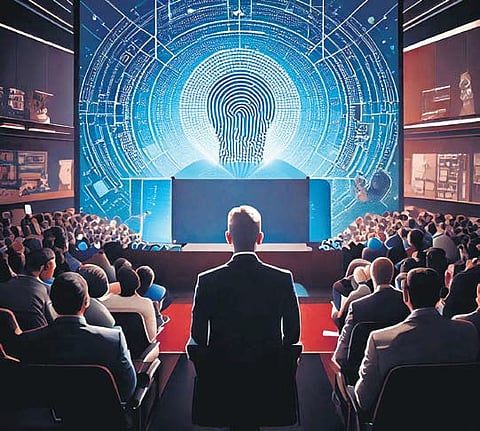

BENGALURU: From uncovering how artificial intelligence and generative AI reshape different sectors to opportunities and challenges, experts at the Bengaluru Tech Summit BTS decoded the AI wave and the unprecedented job disruption that it will create in future. Defence, fintech, and ecommerce start-up founders explained AI opportunities at different sessions held as part of the BTS, the three-day summit that concluded on Thursday.
The BTS started off with a 23-year-old ‘flying man’ from the UK, Issa Kalfon, taking a flight on the campus wearing a jet suit that was designed by Gravity Industries. This was followed by various sessions including AI for India 2030 that brought together various experts talking about scalable AI models, ethical and accessible AI.
Infosys AI head Balakrishna D R said the IT services industry has a great opportunity with AI and that the industry has powered enterprises making the transformation across the world. He said the Indian IT industries can help the entire world adopt AI. The IT services company recently unveiled small language models that utilise general and industry-specific data.
Wipro executive chairman Rishad Premji stated that the productivity that AI can bring is going to be incredibly powerful and that AI is the most disruptive and profound change the technology industry has ever witnessed.
He also spoke about job losses as he mentioned that ‘the reality is that there are going to be some jobs that will disappear’.
He also stressed on creating the right guardrails and the need to ensure the safety of AI adoption. One of the important topics that various experts pointed out is the lack of AI research and patents in India. While China leads with more than 38,000 patents, the US follows with over 6,200 patents. According to a recent report by World Intellectual Property Organisation, India has filed only 1,350 patents.
AI-powered software-driven electronic warfare systems
Vishal Chaudhary, co-founder, ZETWERK, said that the country’s defence sector is witnessing a significant push towards indigenisation, fuelled by substantial budgetary allocations. This trend will foster local capabilities and intellectual property, empowering domestic industries. “SMEs and MSMEs should seize opportunities in emerging sectors like unarmed UAVs and drones, or AI-powered software-driven electronic warfare systems. By focusing on indigenisation, they can make a substantial contribution to national security,” he said.
“As battlefields evolve, AI’s role in defence is poised to expand. We must stay ahead of the curve and leverage AI’s potential to secure our nation’s future,” he added.
Talking about the hype cycle that AI is at present, Aakrit Vaish, CEO Haptik.ai, said there are more AI events, roundtables and organisations than genuine AI startups. “My view is that this is one technology where India cannot just simply be a consumer of the foundations being set somewhere else,” Vaish, who is also advisor to the INDIAAI Mission, said.
Experts also said that the country is waiting for its ChatGPT moment.
AI and Chips
Experts also delved into how AI accelerates chip design at the BTS event. The country’s growth trajectory is increasingly powered by advancements in AI and semiconductor chips, both of which complement each other, said Shankar Krishnamoorthy, technical head of Synopsys. Another key element that experts mentioned was skilling young workforce and students in AI.